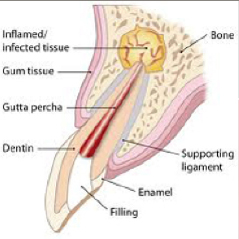Your teeth are held in place by roots that extend into your jawbone. Front teeth usually have one root. Other teeth, such as your premolars and molars, have two or more roots. The tip of each root is called the apex. Nerves and blood vessels enter the tooth through the apex, travel through a canal inside the root, and into the pulp chamber, which is inside the crown (the part of the tooth visible in the mouth).
An apicoectomy may be needed when an infection develops or persists after root canal treatment,or retreatment. During root canal treatment, the canals are cleaned, and inflamed or infected tissue is removed. Root canals are very complex, with many small branches off the main canal. Sometimes, even after root canal treatment, infected debris can remain in these branches and possibly prevent healing or cause re-infection later. In an apicoectomy, the root tip, or apex, is removed along with the infected tissue. A filling is then placed to seal the end of the root.
An apicoectomy is sometimes called endodontic microsurgery because the procedure is done under an operating microscope.

If a root canal becomes infected again after a root canal has been done, it’s often because of a problem near the apex of the root. Your dentist can do an apicoectomy to fix the problem so the tooth doesn’t need to be extracted. An apicoectomy is done only after a tooth has had at least one root canal procedure.
In many cases, a second root canal treatment is considered before an apicoectomy. With advances in technology, dentists often can detect additional canals that were not adequately treated and can clear up the infection by doing a second root canal procedure, thus avoiding the need for an apicoectomy.
An apicoectomy is not the same as a root resection. In a root resection, an entire root is removed, rather than just the tip.
Your dentist may take X-rays and you may be given an antimicrobial mouth rinse, anti-inflammatory medication and/or antibiotics before the surgery.
The endodontist will cut and lift the gum away from the tooth so the root is easily accessible. The infected tissue will be removed along with the last few millimeters of the root tip. He or she will use a dye that highlights cracks and fractures in the tooth. If the tooth is cracked or fractured, it may have to be extracted, and the apicoectomy will not continue.
To complete the apicoectomy, 3 to 4 millimeters of the tooth’s canal are cleaned and sealed. The cleaning usually is done under a microscope using ultrasonic instruments. Use of a surgical microscope increases the chances for success because the light and magnification allow the endodontist to see the area better. Your endodontist then will take an X-ray of the area before suturing the tissue back in place.
Most apicoectomies take between 30 to 90 minutes, depending on the location of the tooth and the complexity of the root structure. Procedures on front teeth are generally the shortest. Those on lower molars generally take the longest.
You will receive instructions from your endodontist about which medications to take and what you can eat or drink. You should ice the area for 10 to 12 hours after the surgery, and rest during that time.
The area may bruise and swell. It may be more swollen the second day after the procedure than the first day. Any pain usually can be controlled with over-the-counter nonsteroidal anti-inflammatory drugs (NSAIDs), such as ibuprofem (Advil, Motrin and others) or prescription medication.
To allow for healing, you should avoid brushing the area, rinsing vigorously, smoking or eating crunchy or hard foods. Do not lift your lip to examine the area, because this can disrupt blood-clot formation and loosen the sutures.
You may have some numbness in the area for days or weeks from the trauma of the surgery. This does not mean that nerves have been damaged. Tell your dentist about any numbness you experience.
Your stitches will be removed 2 to 7 days after the procedure, and all soreness and swelling are usually gone by 14 days after the procedure. Even though an apicoectomy is considered surgery, many people say that recovering from an apicoectomy is easier than recovering from the original root-canal treatment.
If you’re having any pain or swelling from a tooth that has had root-canal treatment, contact your dentist, who will take X-rays and do an exam. If your dentist feels you need an apicoectomy, you will need to set up an appointment for a consultation.

We have been successfully placing and restoring dental implants for many years, enabling patients to smile with confidence.

Today, how you look is more a matter of choice than genes and it is no different when considering your choice of smile.

At Fairlands Dental and Implant Centre we offer a wide range of Orthodontic treatments, providing treatments to people of all ages.

Whitening is a process where the tooth discolouration is 'whitened' to a lighter shade. It removes the staining agent through chemical means.

As dentists with an interest in treating dental phobics, it is essential that we treat you, the patient as an individual and customise your treatment to your specific needs.

At Fairlands Dental And Implant Centre we offer a range of anti-wrinkle and facial rejuvenation treatments.